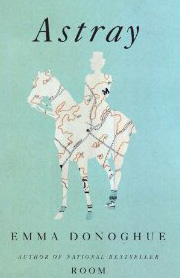 |
Astray is a collection of short stories published in 2012. Donoghue takes an old newspaper article or record and fleshes it out into a story. So it is fiction inspired by a true event. I really like this idea as it's what I tend to do (in my mind) when I'm researching ancestors. The story about Richard is called The Seed, and takes place in Cape Cod, 1639. She writes the story in first person, as if he's writing in a journal. He comes across as very religious and petty, someone who would spy and tattle on neighbors. He judged their misdeeds harshly and believed in severe punishments, even more harsh than what the courts would ordinarily dole out. He was someone who was disliked neighbors in his Yarmouth community. She also implies that he had homosexual yearnings based on the "uncivil living together" court record. He writes as if Teague was coming onto him and thus made a charge of sodomy against him. He also had a dream that Teague was in bed with a woman, Sarah Norman, and accused them in court. He changed his mind when he realized he had actually welcomed Teague's advances and was whipped for committing perjury.
In the story Richard talks of all the people who have died in Yarmouth, including the wife of Teague Jones, whom he calls a godly man whose field is next to his. He doesn't like the new settlers who don't give credit to the first comers who built the town. He was aware of his neighbors' dislike for him and said that Teague was the only one who had much to say to him.
Donoghue sites her inspiration as Plymouth Colony court records and a book by Kenneth Borris: Same-Sex Desire in the English Renaissance, 2004. She wrote that in 1659 Richard Beare of Marshfield, whom she assumes was Richard Berry, was found guilty of "filthy obscene practices" and banished from the colony. She does not mention anything about Richard being married to a woman named Alice whom he had 11 children with, some of whom were born after 1659. I do wonder if Richard Beare of Marshfield is the same man as Richard Berry of Yarmouth.
If I were to write a story inspired by Richard's life, it would be quite different from Donoghue's. But I enjoyed reading the story and appreciate cousin Katharine Reid pointing it out to me. It got me thinking more about what people's lives were like in the early years of Plymouth Colony. Life was so closely governed by the Church and was so intolerant and strict in hindsight. It seems to me that people sometimes turned in their neighbors for perceived sins and misdeeds as a way of survival that was somewhat based in paranoia--get them before they get me. And if God was punishing people for their sins, perhaps they deserved what bad things befell them. And if Satan was working through weak people, then who might be under his spell?
Anyway, it's all interesting to think about!
Where did the wife Alice Price originate,
ReplyDeleteAs far as I know Alice's maiden name hasn't been discovered.
Delete